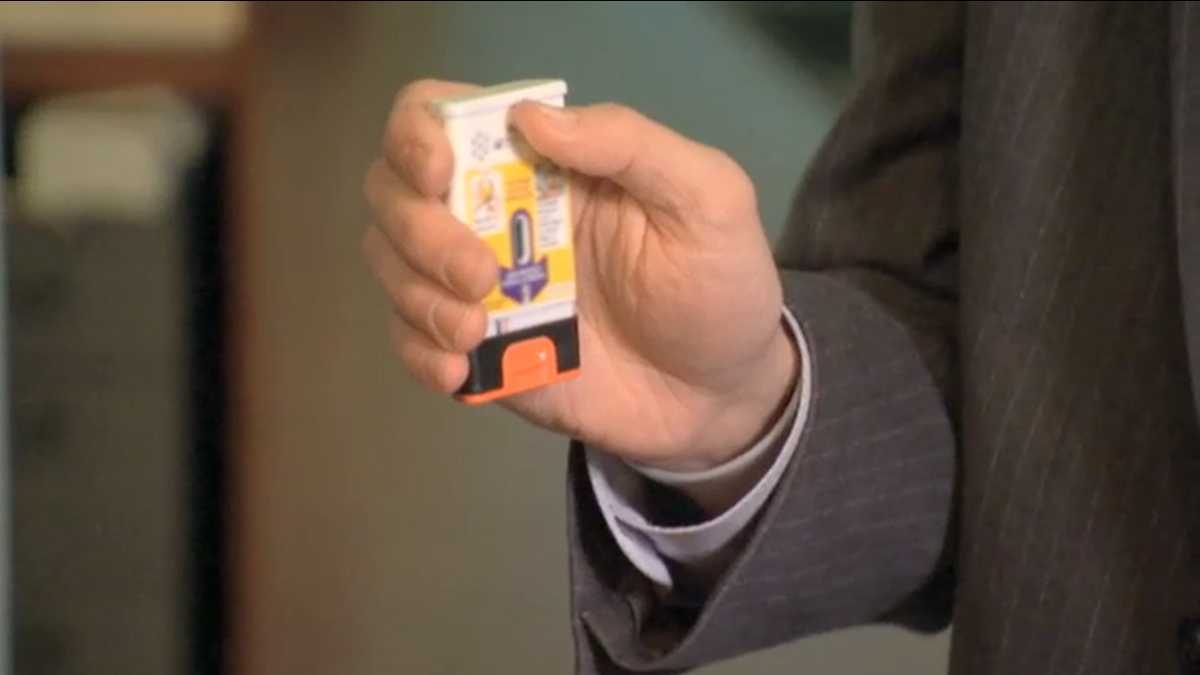Delaware receives second donation of overdose-reversing drug

(Image courtesy of kaleo)
A new donation of 2,000 cartons of naloxone means high school nurses, first responders and addiction treatment centers can save more lives.
On Tuesday, Delaware’s Department of Health and Social Services announced the EVZIO donation it received from kaléo—marking the second donation it has received from the Richmond, Va.-based company.
“This new donation allows us to fan out the supply of naloxone to more corners of the state,” DHSS Secretary Rita Landgraf said in a statement.
“We know the likelihood is strong that these auto-injector kits will save more lives, and, in turn, allow us to connect many of those individuals to the treatment they need to fight to this disease.”
DHSS and advocacy group atTAcK addiction facilitated the first donation of 2,000 cartons back in August 2015 in response to an increased number of overdose deaths in the state.
In 2014, 189 people died from suspected overdoses in Delaware, according to the Centers for Disease Control and Prevention—that’s about one person every other day. Many of those overdoses were the result of heroin, fentanyl or other prescription painkillers, according to the health department.
The new donation will refill the supply for high schools nurses, first responders, medication-assistance treatment centers and the state’s Syringe Exchange Program. Each carton contains two auto-injector units and a training device.
In 2014, Gov. Jack Markell, D-Delaware, signed two pieces of legislation to expand the use of naloxone in the community and among law enforcement departments.
Since then, more than 1,500 community members have been trained to use naloxone, according to the health department. In addition, six police departments—New Castle County, Elsmere, Newark, Middletown, Smyrna and Ocean View—have been trained to carry and administer naloxone, saving dozens of lives.
“We are grateful to kaléo for renewing its generous donation because we know it will help save more lives in our state,” Markell said in a statement.
“The first step in the disease of addiction is to save the life. Then we can work with individuals to get them the treatment they need in order to live full, healthy lives.” In April 2015, the General Assembly passed a resolution sponsored by Sen. Bethany Hall-Long, D-Middletown, permitting use of naloxone among school nurses. Dr. Linda C. Wolfe, director of School Support Services in the Department of Education, said she’s unaware of any deaths occurring in a school due to overdose, but still believes naloxone is an important safety measure.
“Given the rate of overdose and death in Delaware, we are supporting DHSS’ proactive outreach to community partners who work with vulnerable populations,” she said.
First responders and emergency rooms already had access to naloxone. In 2014, it was administered 1,244 times, reviving 668 people, according to the Division of Public Health.
Spencer Williamson, president and CEO of kaléo, said since October 2014, donated EVZIO auto-injectors have saved an average of 10 lives per week.
“At kaléo, our goal has always been to get our potentially life-saving products into the hands of anybody who might need them,” he said in a statement.
“The kaléo Cares Product Donation program is one of many tools we utilize to get EVZIO into the hands of those who might not otherwise have access.”
The EVZIO donation, which costs about $490 a carton, only is short-term because the units have an expiration date of August 2016, according to the health department. Landgraf said she hopes other options to expand the availability of naloxone will be successful.
AtTAcK addiction founding member David Humes said he’s pleased with the work that has been done to make naloxone accessible, but would like to see more police officers and community members carrying the medication. He said naloxone is a safe medication that is proven to save lives and provide hope for those suffering addiction and their families.
“We feel this has greater potential for saving lives,” he said. “It’s easy to administer and if you save someone’s life there’s hope they can turn their lives around.”
DHSS urges those struggling with addiction to call its 24/7 Crisis Services at 1-800-652-2929 in New Castle County or 1-800-345-6785 in Kent and Sussex counties. For prevention, treatment and recovery services in Delaware and nearby states individuals can visit www.HelpIsHereDE.com.
WHYY is your source for fact-based, in-depth journalism and information. As a nonprofit organization, we rely on financial support from readers like you. Please give today.





